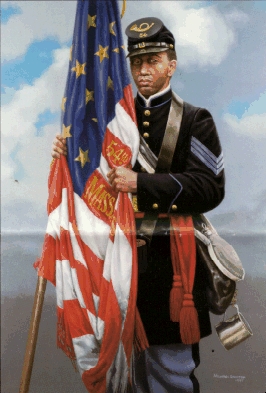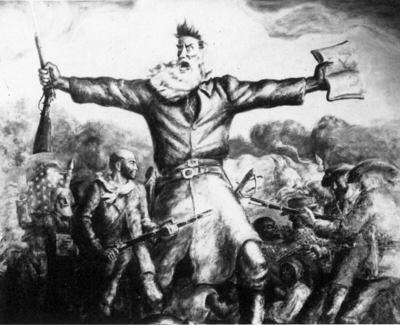The first African American soldier to win the Congressional Medal of Honor was Sgt William H. Carney of the fighting 54th:
His citation reads in part: "When the color sergeant was shot down, this soldier grasped the flag, led the way to the parapet, and planted the colors thereon. When the troops fell back he brought off the flag, under a fierce fire in which he was twice severely wounded..

Sgt. William H. Carney, 54th Massachussettes

The 54th suffered over 281 casualties inlcuding 54 KIA and 48 missing in action.
The Fighting 54th went on to fight many other battles.
I remember watching the movie "Glory". It was one of the best movies I've seen in content because it was one of the first movies to attempt a realistic view of raising and training the first African American unit and portraying the views of the different people involved. Frankly, I never thought Matthew Broderick did a convincing portrayal of a firery abolitionist. Maybe I just saw him as "Bueller" too much? What I thought was that the other actors around him, like Denzel Washington, pulled the movie off.
I was commenting on the views of the characters. What I found interesting was the portrayal of even the abolitionist Shaw as having condescending views of their troops until they slowly came to respect them as men.
I remember reading how many abolitionist were actually anti-war as well. Largely because the abolitionist movement started within the Quaker movement which was pacifist by nature.
I grew up in Kansas. I visited John Brown's famous home and the site of the Pottowatamie massacre where John Brown and his sons struck down slavers with their swords. People said that John Brown was a fanatic. We hadn't yet begun the civil war, but I think he knew what was coming and what it would take to make men free. In the Topeka rotunda is a mural of Kansas. Above many depictions of life in Kansas, rises the figure of John Brown, larger than life, his arms outstretched above the scenes, a bible in one hand and a rifle in the other.

Black and white drawing of Topeka mural John Brown

I've often thought of that mural because, when I was a kid, I thought that John Brown looked scary with his grey flowing beard, his mouth open and his eyes seeming to flash fire. He seemed like all of my thoughts of a vengeful God.
John Brown was captured near Harper's Ferry in 1859 when he attempted to raid the federal armory to gain weapons and arm his own army, ostensibly of slaves he would have freed after the raid. The irony was that he was captured by Colonel Robert E. Lee accompanied by Jeb Stewart. John Brown was executed in December 1859 after being convicted of treason. Some said he was an insurgent. Some a fanatic. Other's a hero.
Interesting how time and the end of a war can turn a man from crazy to a near prophet of things to come. At his trial, he gave an address to the court in which he states:
Had I interfered in the manner which I admit, and which I admit has been fairly proved (for I admire the truthfulness and candor of the greater portion of the witnesses who have testified in this case), -- had I so interfered in behalf of the rich, the powerful, the intelligent, the so-called great, or in behalf of any of their friends -- either father, mother, sister, wife, or children, or any of that class -- and suffered and sacrificed what I have in this interference, it would have been all right; and every man in this court would have deemed it an act worthy of reward rather than punishment.
The court acknowledges, as I suppose, the validity of the law of God. I see a book kissed here which I suppose to be the Bible, or at least the New Testament. That teaches me that all things whatsoever I would that men should do to me, I should do even so to them. It teaches me further to "remember them that are in bonds, as bound with them." I endeavored to act up to that instruction. I say, I am too young to understand that God is any respecter of persons. I believe that to have interfered as I have done -- as I have always freely admitted I have done -- in behalf of His despied poor, was not wrong, but right. Now if it is deemed necessary that I should forfeit my life for the furtherance of the ends of justice, and mingle my blood further with the blood of my children and with the blood of millions in this slave country whose rights are disregarded by wicked, cruel, and unjust enactments. -- I submit; so let it be done!
John Brown's small army of 22 included five African Americans. Two were killed at Harper's Ferry, one escaped and two were executed. One of the executed, John Anthony Copeland, Jr.,, was heard to say on his way to execution:
"If I am dying for freedom, I could not die for a better cause -- I had rather die than be a slave!"

We are the Blorg. Resistance to the Truth is Futile.
ReplyDelete